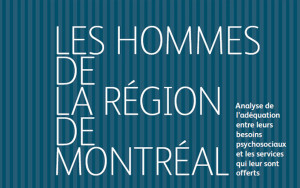
Proceedings of the Quebec Forum on the Consequences and Prevention of Sexual Abuse Against Men
The First Quebec Forum on the Consequences and Prevention of Sexual Abuse Against Men

Assessing the Fit Between Their Psychosocial Needs and the Services Offered to Them
Assessing the Fit Between Men's Psychosocial Needs and the Services Offered to Them
Lajeunesse, S.-L., Houle, J., Rondeau, G., Bilodeau, S., Villeneuve, R., & Camus, F. (2013). Les hommes de la région de Montréal. Analyse de l’adéquation entre leurs besoins psychosociaux et les services qui leur sont offerts. Montréal: ROHIM.
Executive Summary
Available statistics show that men in Montreal have a life expectancy five years shorter than women, are less likely to have a family doctor, and are just as likely to live with low after-tax income. In Montreal, 75% of suicide deaths are among men.
Men and women experience mental health issues at similar rates, but the types of disorders tend to differ. Women are more likely to suffer from depression or anxiety disorders, while men are more likely to experience substance abuse or dependency issues.
Despite this, men represent only one-third of those who use public health (CLSC) mental health services. Our understanding of men’s health in Montreal remains limited, as government reports rarely disaggregate data by gender.
To date, no study has assessed whether the services available in the Montreal region are suited to men’s specific needs. We lack insight into the challenges service providers face when working with men and whether they see opportunities to improve their approaches.
The main goal of this research is to analyze the gap between men's psychosocial needs and the services offered in the Montreal region, in order to identify ways to improve service delivery. More specifically, the study has four objectives:
Inventory the available resources and services offered to men in the Montreal region;
Gather service providers’ perceptions of how well their services align with men’s needs;
Identify specific challenges encountered when intervening with men;
Understand, from the perspective of male users of psychosocial services, which needs remain unmet and how they perceive the quality of services available to them.

The First Quebec Forum on the Consequences and Prevention of Sexual Abuse Against Men

